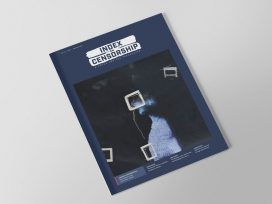The OSCE representative for free expression critices the US media in the wake of the 11 September attacks and exposes the attacks on freedom in Chechnya. He also expresses his disquiet on the media landscape in Silvo Berlusconi’s Italy.
Florence Amalou: You recently said that “the state of law in the USA and Europe came to an end within minutes of 11 September”. You’ve just returned from Los Angeles and Washington, do you still think the US has gone off on a “crusade”?
Freimut Duve:We’re faced with a recurrent problem. Whenever a country considers itself to be at war, freedom of expression is the first casualty. The urge to abandon plurality and debate is overwhelming. What I have just observed in the USA is that debate is slowly returning, but very slowly. The media is coming to se that for over a month, it has been trapped in an extreme position. Three journalists even lost their jobs for writing articles their owners and, far worse in my opinion, the advertisers – not the government – considered “negative”. No doubt they will at some point look back with a certain self criticism at the silence imposed on the media these last few weeks. Not a word, for instance on the USA’s former role in creating and supporting the Taliban. Even now, the majority of US journalists keep quiet on such things.
FA: How do you explain this silence in the land of the First Amendment, where freedom of expression is more strongly protected than anywhere else?
FD: I think journalists, and media owners and directors are suffering from a “post-Vietnam patriotic syndrome”. When the US went to war in Asia and got embroiled in a disastrous conflict, they blamed their failure on the lack of public support back home. At the time, critics of the war in the media and on the streets were highly visible and often violent, to the point that the politicians could attribute their failure out there to the battle raging within the US. On 11 September, Americans were attacked on their own territory. Given what had happened over Vietnam, they couldn’t allow “their boys” to criticise and to forget the trauma with which they had been confronted.
One of the problems of free expression in the US press is the high concentration of ownership in the media world. There are only five or six television stations that really matter, very few newspapers. Bit by bit, journalists are allowing themselves to ask the hard questions. Take Saudi Arabia: until now, this country has never been the subject of any analysis or criticism. Debate is beginning to see the light of day, but the columnists and reporters on major papers will probably not go so far as to question US foreign policy in Latin America, for instance. Even so, they may finally end up asking themselves the question, “What did we do in Afghanistan?”
FA: What about Europe? You’ve spoken of the “tightrope” being walked by free expression. Could you be more precise?
FD: In Europe, too, media debate was shaken because we had to deal with a shock that was presented as having global significance, a global audience. The European media mirrored the psychological shock of the USA but did not entirely suspend its critical faculties. We felt the sorrow, the pain; we expressed our friendship. But very quickly, that generation of European journalists who had their own memories of war, distanced themselves from those emotions. As a child, I myself saw the houses of my town reduced to rubble by bombs. Whole districts were destroyed; entire streets disappeared under rubble. But in the Hamburg of those days, no one had a camera.
In Europe, at the beginning, criticisms of the US riposte on Afghanistan were frowned on; but pluralism and debate soon resumed their place – even if there is still a widespread tendency to harp on the “hands off our American partner” theme. You can also find sharp denunciations of a traitor to the allied friendship. But in general, the European media has done better than its US counterpart in keeping people informed of events.
However, I have to make a distinction between, say, the French and German media and the media landscape in Italy, which is giving serious cause for concern.
The current President of the Council [head of government], Silvio Berlusconi, is the owner of a media group that never criticises him: journalist keep their mouths shut. We’re working on this.
FA: On 4 October, you informed the OSCE council on the state of affairs in Azerbaijan; and you criticise Russia constantly. To what extent is the latter responsible for what you have dubbed “the spiral of silence” in Central Asia?
FD: During my visit to Washington, I once again made my position clear to the government: I shall continue to criticise any checks on free expression by America’s new “partners” in Central Asia. Particularly when these “partners” are countries where I have serious cause for concern (such as Uzbekistan, Tajikistan and Azerbaijan).
But apart from this, Russia presents us with a problem. You must remember that Russia went to war against Chechnya with only one justification: its war on “Islamic terrorism”. It’s pointless going over the fact that since 11 September it has been even easier to silence journalists writing on the Chechen situation; as far as the majority of Russians are concerned, it no longer merits discussion. Journalist who criticise government action there are seen as friends of the terrorists. In any case, there’s no longer a single journalist down in Chechnya; all the special correspondents are in Afghanistan.
Since 12 September, I’ve asked people in my office not to use the word “terrorist”. It’s a dangerous word: it can stigmatise anyone, whether or not that person has been tied to any criminal act. You can point the finger at an enemy without going into details. Any imprecision encourages people to put everything into the same bag and licences excess. The media is to some extent responsible for this; they should have described Bin Laden as a criminal assassin and not gone hook, line and sinker for this “terrorism” business.
FA: What’s the official OSCE line on all this as far as its 55 member states are concerned? What do you think of the “reasons of state” argument as against the duty in democratic countries to keep the people informed?
FD: Officially, the permanent council has let it be know that it will not allow the war on terrorism to affect the rights and freedoms of the press. It should not be used as an excuse to limit human rights. If we abandon the law, we shall be back living under Roman law. Contrary to the way many public personalities in the USA have acted, we must avoid passing from legal arguments to religious ones, or moving into the territory of “reasons of state”. Wherever there is fear, arguments based on “state security” are not far behind. Personally, I would rather talk of responsibility.
Published 15 March 2002
Original in French
Translated by
Judith Vidal-Hall
First published by Le Monde 2001-11-07
Contributed by Index on Censorship © Index on Censorship eurozine
PDF/PRINTNewsletter
Subscribe to know what’s worth thinking about.



